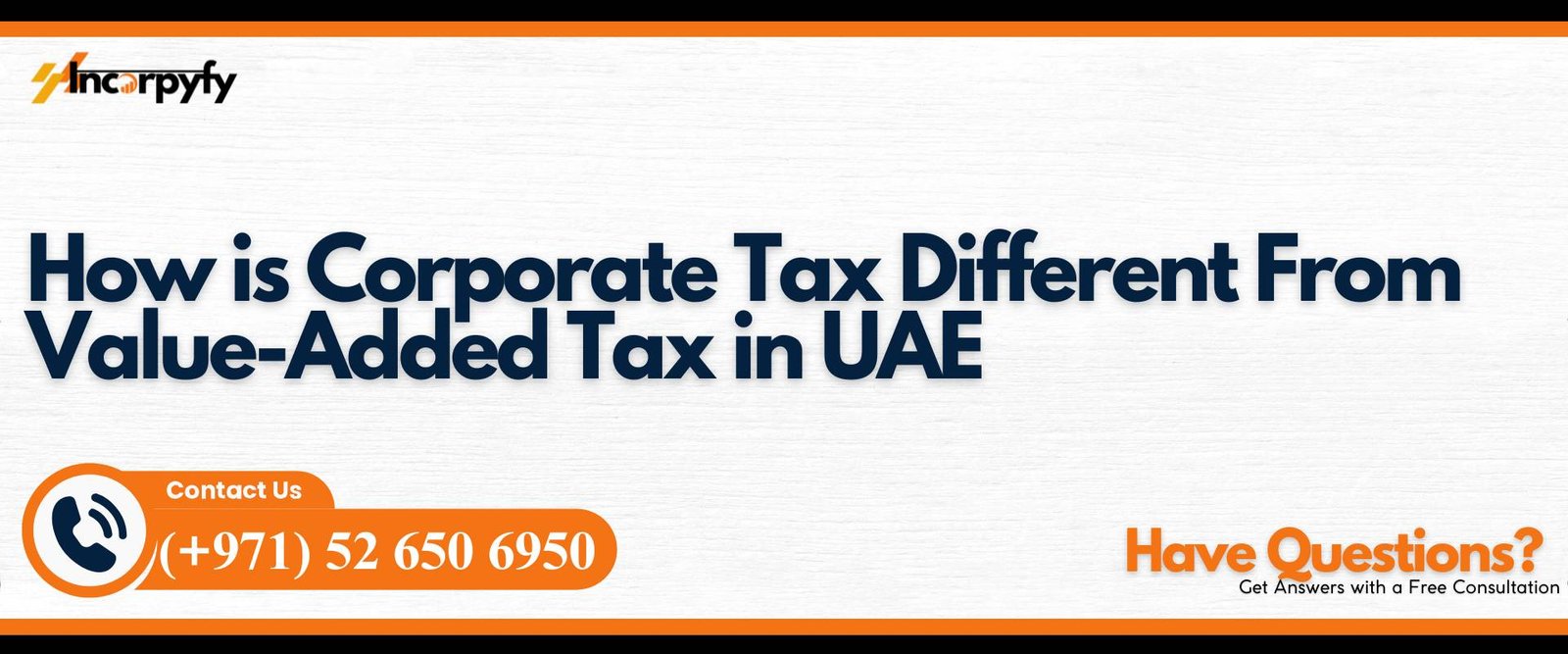
As the UAE shifts towards a more structured tax system, many businesses are navigating two key obligations: Corporate Tax (CT) and Value-Added Tax (VAT). Both play a vital role in shaping the financial and compliance responsibilities of companies. But how are they different? Let’s break it down in this complete guide, using a clear tone, friendly structure, and helpful.
Understanding the UAE Tax Landscape
The UAE has moved from being a tax-free economy to a transparent, business-aligned jurisdiction. It introduced Value-Added Tax (VAT) in 2018 and Corporate Tax (CT) in 2023 to align with global tax practices, reduce reliance on oil revenues, and meet international standards on transparency.
What is Corporate Tax in the UAE?
Corporate Tax in UAE is a direct tax imposed on the net profits of companies. It applies to both Mainland and Free Zone companies under certain conditions.
Who Needs to Pay Corporate Tax?
- Mainland companies with taxable income above AED 375,000
- Free zone companies not qualifying for the 0% incentive
- Foreign entities operating through a permanent establishment
Corporate Tax Rate in the UAE
- 0% on taxable income up to AED 375,000
- 9% Corporate Tax on profits above AED 375,000
- A higher rate applies to multinationals under OECD’s Pillar Two rules
What is Value-Added Tax (VAT) in the UAE?
VAT in UAE is an indirect tax applied to the sale of goods and services. It is charged at each point of sale and collected by businesses on behalf of the government.
VAT Rates in the UAE
- 5% Standard VAT on most goods and services
- 0% VAT on exports, education, and healthcare (in specific cases)
Key Differences Between Corporate Tax and VAT in UAE
Understanding these differences is crucial for compliance and tax planning.
Type of Tax
- Corporate Tax is a direct tax on profit
- VAT is an indirect tax on consumption
Who Pays?
- Corporate Tax is paid by the business on its profits
- VAT is paid by the end consumer, collected by the business
Filing Requirements
- Corporate Tax Filing: Annually
- VAT Filing: Quarterly or monthly
Applicability for Mainland Companies
Mainland companies are fully subject to both VAT and Corporate Tax.
VAT Registration
- Required if turnover exceeds AED 375,000
- Optional for voluntary threshold of AED 187,500
Corporate Tax Liability
- Must register for Corporate Tax
- File returns within 9 months after the financial year
Applicability for Free Zone Companies
Free zone companies may enjoy 0% Corporate Tax if they meet Qualifying Free Zone Person criteria.
Corporate Tax Incentives in Free Zones
- Must maintain adequate substance in the free zone
- Income must come from eligible sources
VAT Still Applies
- Most free zone companies must charge 5% VAT on taxable supplies
- Exemptions apply in designated zones
Corporate Tax vs VAT – Impact on Profit and Cash Flow
Corporate Tax reduces net profit as it’s charged on yearly income, while VAT affects cash flow directly since it’s collected on sales and paid periodically. Businesses must manage both efficiently—VAT impacts short-term liquidity, and Corporate Tax affects long-term earnings. Strategic planning helps balance these effects on overall financial health.
Corporate Tax Impact
- Reduces net profit
- Can be managed through deductions and allowable expenses
VAT Impact
- Impacts pricing strategy
- Must be collected and reported periodically
Reporting and Compliance Differences
Corporate Tax and VAT have different reporting and compliance rules in the UAE. VAT requires monthly or quarterly filings based on taxable supplies, while Corporate Tax involves annual returns based on net profit. Each has unique forms, deadlines, and audit processes, making it important to manage both with separate attention and accuracy.
Corporate Tax Filing
- Financial statements must be prepared and audited
- Tax returns filed within 9 months of year-end
VAT Filing
- Submit VAT return online via FTA portal
- Include sales, purchases, and output/input VAT
Tax Planning Strategies for UAE Companies
Effective tax planning strategies help UAE companies reduce liabilities and stay compliant. Use allowable deductions, choose the right business structure, and track expenses accurately. Leveraging free zone benefits and staying updated with tax law changes can optimize savings. Regular consultations with tax advisors ensure smart, forward-thinking financial planning.
Corporate Tax Planning
- Use group relief where eligible
- Maximize allowable deductions
VAT Planning
- Ensure correct invoicing
- Avoid penalties through timely filing
Penalties and Non-Compliance in UAE Tax Laws
Failing to follow UAE tax laws can result in serious consequences. Businesses may face fixed fines, daily penalties, or even license suspension for delays in Corporate Tax or VAT registration and filing. Non-compliance affects credibility and operations. Staying organized and meeting deadlines helps avoid costly legal and financial setbacks.
Corporate Tax Penalties
- Fines for late registration, return submission, and inaccurate filing
VAT Penalties
- Heavy penalties for incorrect invoicing, late filing, and wrong returns
Exemptions in Corporate Tax and VAT
Certain sectors and transactions enjoy exemptions from Corporate Tax and VAT in the UAE. For example, healthcare, education, and specific financial services are often VAT-exempt. Small businesses below the taxable income threshold may be exempt from Corporate Tax. Understanding these exemptions helps in better planning and tax-saving strategies.
Corporate Tax Exemptions
- Personal income
- Investment returns
- Certain Free Zone entities
VAT Exemptions
- Residential rent
- Local transport
- Certain financial services
Corporate Tax and VAT Registration Process in the UAE
The registration process for Corporate Tax and VAT in the UAE is done through the Federal Tax Authority (FTA) portal. Businesses must create an account, submit relevant documents, and provide financial details. Each tax requires a separate registration, and approvals are typically issued within days after verification and compliance checks.
Corporate Tax Registration
- Through the EmaraTax portal
- Requires trade license, financials, and Emirates ID
VAT Registration
- Also via the FTA portal
- Requires turnover evidence, license, and contact details
When Are You Required to Register for Both Taxes?
You must register for both Corporate Tax and VAT when your business meets the required thresholds. VAT registration is mandatory if annual turnover exceeds AED 375,000. Corporate Tax applies once your taxable income crosses the exemption limit. Dual registration ensures full compliance and avoids legal or financial penalties in the UAE.
Dual Taxpayer Conditions
If your business earns above AED 375,000 in taxable turnover and profits, you must register for both Corporate Tax and VAT.
Also Read: VAT Consultants in Dubai
Choosing the Right Business Structure for Tax Benefits
Choosing the right business structure in the UAE directly affects your tax liabilities. Free zone entities may enjoy corporate tax exemptions, while mainland companies follow standard rates. Assess your business activity, expansion plans, and client base. The right setup can maximize tax benefits and support long-term financial efficiency and growth.
Mainland vs Free Zone
- Mainland gives market access, but comes with full tax rates
- Free Zone may offer 0% Corporate Tax, but has scope limitations
How to Keep Your UAE Business Tax Compliant
To keep your UAE business tax compliant, maintain accurate financial records, file returns on time, and understand your obligations for both VAT and Corporate Tax. Regular audits, using accounting software, and consulting with tax experts help avoid penalties. Stay updated with FTA guidelines to ensure smooth and legal operations.
Hire Tax Experts or Consultants
- They help manage filings, audits, and ensure compliance
Use Accounting Software
- Automates VAT and Corporate Tax calculations
- Reduces human error
Top Industries Most Affected by VAT and Corporate Tax
Several industries in the UAE feel the direct impact of VAT and Corporate Tax, especially those with high revenue and profit margins. Sectors like retail, eCommerce, real estate, healthcare, logistics, and professional services face strict tax filing requirements, cost adjustments, and compliance challenges due to their financial and operational structures.
Retail and eCommerce
- Charge VAT on products
- Pay Corporate Tax on net profits
Real Estate and Construction
- Residential may be VAT exempt
- Profits still attract Corporate Tax
Future of Taxation in the UAE
The tax landscape will evolve further as the UAE moves toward global alignment. Businesses must stay updated and plan accordingly to remain competitive and compliant.
Conclusion
While Corporate Tax and Value-Added Tax (VAT) in the UAE serve different purposes, understanding both is essential for every business. Corporate Tax directly affects your bottom line, while VAT affects your pricing, sales, and customer relationships. By staying compliant, registering on time, and aligning your structure properly, you can optimize both.
Corporate Tax Registration in Dubai, UAE should not be seen as a burden, but as a business responsibility that ensures long-term sustainability. Whether you operate in the Mainland or a Free Zone, both tax types now play a role in your financial planning.
FAQs
Do I need to register for both VAT and Corporate Tax in UAE?
Yes, if your annual revenue is above AED 375,000 and your profits exceed AED 375,000, you must register for both.
Are Free Zone companies exempt from Corporate Tax?
Not all. Only Qualifying Free Zone Persons are eligible for 0% Corporate Tax. Others are taxed at 9%.
What is the difference between direct and indirect tax?
Corporate Tax is direct—it’s on profits. VAT is indirect—it’s on consumption paid by customers.
Can I claim VAT back in UAE?
Yes, Input VAT can be recovered on eligible purchases and expenses.
What happens if I don’t register for Corporate Tax?
You may face heavy fines and legal penalties. Timely registration is mandatory.
How do I file VAT in the UAE?
You file online on the Federal Tax Authority (FTA) portal every quarter or month, depending on your filing cycle.
Do freelancers pay Corporate Tax in UAE?
If they are licensed and earn above AED 375,000 profit, then yes, they must register and pay.
Is residential rent subject to VAT in UAE?
No, residential rent is VAT-exempt, while commercial leases are taxed.
Are there any tax exemptions for startups in UAE?
Startups in Free Zones may benefit from 0% Corporate Tax and VAT advantages, depending on the setup.
What’s the filing deadline for Corporate Tax?
You must file your corporate tax return within 9 months after the end of your financial year.






